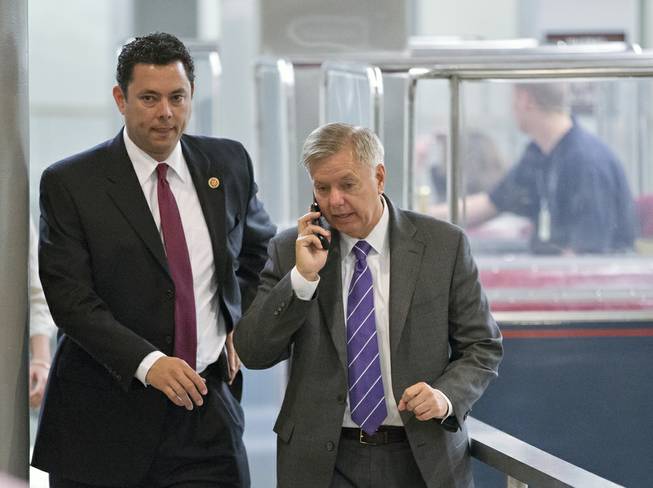
AP Photo/J. Scott Applewhite
Rep. Jason Chaffetz, R-Utah, left, and Sen. Lindsey Graham, R-S.C., walk together as Graham and other senators head to the floor at the Capitol in Washington, Wednesday, July 10, 2013.
Tuesday, March 25, 2014 | 9:20 p.m.
The Nevada delegation doesn't agree with the latest effort by Rep. Jason Chaffetz, R-Utah, and Sen. Lindsey Graham, R-S.C., to roll back online gaming to the days when it was totally illegal, with no poker carve-out.
But they won't dismiss Chaffetz and Graham's forthcoming legislation out of hand either.
"Get the bill out there first, take a look at it, see what it does," Sen. Dean Heller, R-Nev., said Tuesday after a meeting of the Nevada delegation.
"We're going to take it one step at a time," Senate Majority Leader Harry Reid, D-Nev., added.
Reid and Heller, who both support legalizing poker only, have had many open and politically charged disagreements about how best to get an online gaming measure through Congress. But they now count themselves on the same page when it comes to facing a bill that could pose a serious threat to online poker ever being federally legalized: See what it is, and whether they could, in the future, work a carve-out into the bill.
The Chaffetz-Graham legislation seeks to restore a prior reading of the Wire Act that made financial transactions for all forms of online gaming illegal.
In late 2011, the Justice Department reinterpreted the 1961 Wire Act, making it possible for states in which online gaming was legal to process the payments for bets. That, in turn, created the possibility of states with similar rules on Internet gaming to join forces — which happened for the first time last month, when Delaware and Nevada announced they would launch the country's first cooperative online gaming venture this year.
"I support the effort of states to decide for themselves whether or not to legalize poker," Reid said Tuesday, calling it "the best solution for Nevada."
But Reid also doesn't want to see online gaming in all its forms proliferate without some federal intervention.
"We also believe a significant expansion of gambling would bring slot machines to every computer," Reid said Tuesday. "It's bad for Nevada and bad for the country."
Reid and Heller have sought in the recent past to build support for legislation that would roll back the 1961 Wire Act, rendering Internet gaming illegal once again but have a special carve-out for online poker, which would then be legal nationwide.
But they haven't been able to come up with the votes to get any such legislation over a potential filibuster hurdle — making it difficult to change the "status quo" on gaming, which Reid acknowledged, "isn't working."
Hence, they are entertaining the introduction of the Chaffetz-Graham bill — not because they agree with its ultimate goal or think it is perfect, but because, it seems, it is at least a new voice in the conversation.
Reid and Heller would not openly criticize the authors of the new bill, or the efforts of Las Vegas casino mogul Sheldon Adelson, who has been working to undermine what tentative support existed for legalizing online poker.
"Whether you agree or not, I've been very impressed with the initial efforts and thoroughness [of Adelson's team's work]," Reid said Tuesday. "For example, they sent a big team of people to Northern Nevada. Northern Nevada's suffered because of Indian gaming tremendously — Northern Nevada folks called me and said they were glad that Andy Abboud and others came up there to talk about that."
"Everyone has an opinion, let's just put it that way," Heller said. "They don't always agree, but everyone has an opinion."
Graham and Chaffetz are expected to introduce their anti-online gaming legislation this week.

Join the Discussion:
Check this out for a full explanation of our conversion to the LiveFyre commenting system and instructions on how to sign up for an account.
Full comments policy